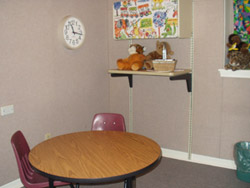Forensic Services

CASGSL provides forensic interviews to children who have allegedly been sexually abused, physically abused or witnessed a violent crime. The goal of the interview is to provide a safe environment where the child is invited to talk about matters of concerns. When indicated, details of the alleged abuse are sought. At the same time, the child is reassured that the abuse was not his or her fault.
CASGSL receives referrals for forensic interviews from the Children's Division/Missouri Department of Social Services and/or law enforcement agencies. In these cases, a call to the Missouri Child Abuse and Neglect Hotline, or a police report, has been made, indicating
During the interview, the child sits in a comfortable, child-friendly room and is interviewed by a trained CASGSL Forensic Interviewer in an effort to explore areas of safety and concern. The interviewer is careful to identify and consider the child’s individual needs and communication styles. Care is given to avoid “putting words in the child’s mouth.” Other members of the team observe via a one-way mirror and communicate with the interviewer discreetly if necessary.

Following the interview, the team meets with the parent/caregiver to discuss the next steps.
CASGSL also provides victim advocacy services for the families and children who receive forensic interviews. Our victim advocates